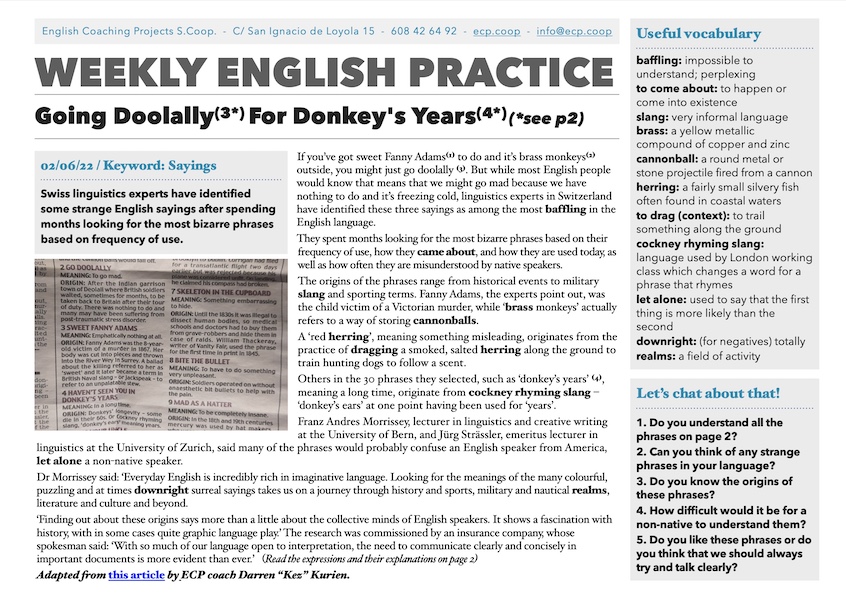Going Doolally For Donkey’s Years
02/06/22 / Keyword: Sayings
Swiss linguistics experts have identified some strange English sayings after spending months looking for the most bizarre phrases based on frequency of use.
Click HERE to download the Weekly English Practice as a PDF.
Useful vocabulary
baffling: impossible to understand; perplexing
to come about: to happen or come into existence
slang: very informal language
brass: a yellow metallic compound of copper and zinc
cannonball: a round metal or stone projectile fired from a cannon
herring: a fairly small silvery fish often found in coastal waters
to drag (context): to trail something along the ground
cockney rhyming slang: language used by London working class which changes a word for a phrase that rhymes
let alone: used to say that the first thing is more likely than the second
downright: (for negatives) totally
realms: a field of activity
Listen to the audio and read the text.
Swiss linguistics experts have identified some strange English sayings after spending months looking for the most bizarre phrases based on frequency of use.
If you’ve got sweet Fanny Adams to do and it’s brass monkeys outside, you might just go doolally. But while most English people would know that means that we might go mad because we have nothing to do and it’s freezing cold, linguistics experts in Switzerland have identified these three sayings as among the most baffling in the English language.
They spent months looking for the most bizarre phrases based on their frequency of use, how they came about, and how they are used today, as well as how often they are misunderstood by native speakers.
The origins of the phrases range from historical events to military slang and sporting terms. Fanny Adams, the experts point out, was the child victim of a Victorian murder, while ‘brass monkeys’ actually refers to a way of storing cannonballs.
A ‘red herring’, meaning something misleading, originates from the practice of dragging a smoked, salted herring along the ground to train hunting dogs to follow a scent.
Others in the 30 phrases they selected, such as ‘donkey’s years’, meaning a long time, originate from cockney rhyming slang – ‘donkey’s ears’ at one point having been used for ‘years’.
Franz Andres Morrissey, lecturer in linguistics and creative writing at the University of Bern, and Jürg Strässler, emeritus lecturer in linguistics at the University of Zurich, said many of the phrases would probably confuse an English speaker from America, let alone a non-native speaker.
Dr Morrissey said: ‘Everyday English is incredibly rich in imaginative language. Looking for the meanings of the many colourful, puzzling and at times downright surreal sayings takes us on a journey through history and sports, military and nautical realms, literature and culture and beyond.
‘Finding out about these origins says more than a little about the collective minds of English speakers. It shows a fascination with history, with in some cases quite graphic language play.’ The research was commissioned by an insurance company, whose spokesman said: ‘With so much of our language open to interpretation, the need to communicate clearly and concisely in important documents is more evident than ever.’
Adapted from this article byECP coach Darren “Kez” Kurien.
Let’s chat about that!
- 1. Do you understand all the phrases on page 2?
- 2. Can you think of any strange phrases in your language?
- 3. Do you know the origins of these phrases?
- 4. How difficult would it be for a non-native to understand them?
- 5. Do you like these phrases or do you think that we should always try and talk clearly?

